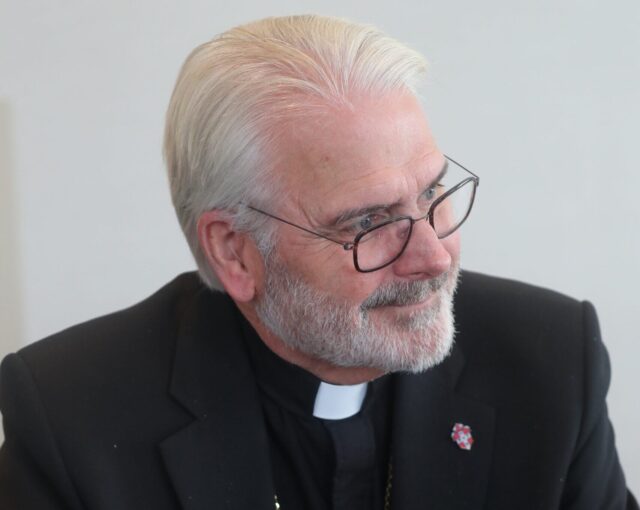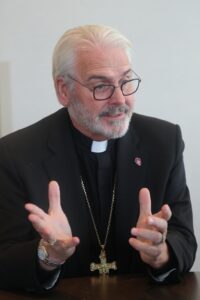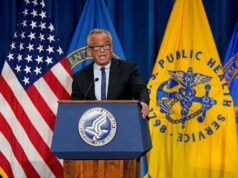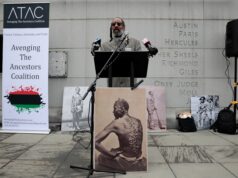
BALTIMORE — Archbishop Paul S. Coakley of Oklahoma City was elected as the next president of the U.S. Conference of Catholic Bishops. He succeeds Archbishop Timothy P. Broglio of the U.S. Archdiocese for the Military Services, who has served in that office since 2022, at the end of the bishops’ Nov. 10-13 fall plenary.
Archbishop Coakley sat down with OSV News to discuss his new leadership role in the conference. The interview has been edited for length and clarity.
OSV News: What do you hope to bring to your exercise of the office of president in the next three years?
Archbishop Coakley: I would like to demonstrate that we as bishops of the United States are far more unified pastorally, fraternally than is often portrayed in a lot of the media and a lot of people’s imaginations. The narrative is out there that the American bishops are divided, we’re polarized, and that’s not been my experience. I think there’s a lot more mutual understanding and support for one another and genuine friendship among us. So I would like to be able to show that over the course of the presidency that I’m embarking upon — that we are a wonderful fraternal body and united in this common mission as successors of the apostles in the United States.
OSV News: The issue of immigration is one of the political issues that most would agree is dividing Catholics at this moment. What do you think could be the most effective in helping the faithful build a truly Catholic perspective on this issue?
Archbishop Coakley: One thing that comes to mind is to help our people see this not as a political right or left, red or blue issue, (but as) a concern that we share as members of the Body of Christ, as Christians, as members of the baptized — certainly, as bishops and priests. We have concern for our brothers and sisters, for their well-being, that their human dignity be respected and protected and promoted. But we also have a concern for our nation — that everybody deserves to live in security and peace. And so we have a responsibility as a nation to protect our own borders and promote access to this nation in a legal fashion. Reform of our immigration policies would be so beneficial for everybody in this nation.
OSV News: Archbishop (James F.) Checchio said yesterday in his presentation to the bishops on the conference budget, “Times have changed, but our physical structure has not. And the way we do business largely remains the same.” Drawing from your experience of leadership so far in this conference, what would you say might need to change about the way the conference does business?
Archbishop Coakley: Well, we certainly need to be good stewards of our assets and resources. I’m not sure if Archbishop Checchio was referring to the physical USCCB headquarters. If so, I would tend to agree. We have a beautiful facility, a beautiful building, but it’s being underutilized right now. We’d like to find a good, practical and economically feasible way of being good stewards of that resource.
OSV News: No question, it’s an exciting time in the church right now in the United States, with the election of the first U.S.-born pope. How do you hope to best be of service to him as president of the U.S. bishops’ conference?
Archbishop Coakley: I really look forward to meeting Pope Leo — as a bishop, as a fellow American, as a Catholic. I would like to be able to have a line of communication with him — an opportunity to help share our perspectives, that is on behalf of the bishops, on how things are here in the United States. I don’t know where his information sources might be, I’m sure they’re trustworthy and good, but I want him to understand our United States Catholic lived reality, and particularly our love and support for him and for his predecessors. I think that American Catholics have been historically very supportive of Rome and the papacy, not just financially but spiritually. There’s a great love for the pope among our American Catholics, and I want him to experience that from us.
OSV News: The church in the U.S. is experiencing growth, in many areas including your own. But there is also what appears to be a general overarching decline of our institutional footprint across the country, with closures and mergers of parishes, schools and other facilities. How would you encourage Catholics observing this decline to keep the faith?
Archbishop Coakley: Our institutions obviously are very important, but the church is more than its institutions. So my encouragement for Catholics is to remain rooted in Jesus Christ — to become disciples, to live that discipleship in terms of mission. And I think that’s how the church will be revitalized, as we have a renewed encounter with the person of Jesus Christ and under the power of his Spirit, to serve him in our parishes, in our schools, communities, our homes and families, particularly among our lay Catholics — to be the light, to be the leaven that we’re called to be. And to the extent that we do that, I think the institutional life will recover and will flourish.
We have many vibrant Catholic institutions still. The decline that you refer to is not universal. In many parts of the United States, it’s still quite a vibrant institutional life in the United States. So I’d be careful about the narrative that we accept, that we need to be sure that it’s an accurate and correct narrative. Many parts of the country, including in our own area in Oklahoma, we have vibrant strong parishes, vibrant Catholic schools, vibrant Catholic health care. So institutional life is not necessarily on the decline across the country. Populations, demographics have shifted, obviously, and we need to be prepared and able to follow that and build up the church where the Catholic population is currently, not where it was in the 19th or early 20th century because, obviously, there have been movements in that regard.
OSV News: Critics have tried to use against you a 2018 letter of support you sent the people of your archdiocese, in which you expressed support for fully investigating the scandal surrounding Theodore McCarrick and help bring “purification” to the church after revelations published by the former apostolic nuncio to the U.S., who then enjoyed a sterling reputation. How would you best characterize your motivations for that letter?
Archbishop Coakley: The harm that was done through that scandal has been deep and mistrust that followed is real. My comments at that time — I don’t remember, honestly, the contents of the statement — I didn’t know Archbishop (Carlo Maria) Viganò other than what I knew of him from walking these halls here at bishops’ meetings. He was always a gentleman, he was always supportive, he always showed an interest in how things are going in our dioceses. My comments when he was initially being criticized, and allegations being leveled against him, were meant to convey that that certainly has not been my experience of the man. And I just didn’t want to jump to conclusions before all of the information was available. So I think, in retrospect, I think a lot more about his views became apparent in subsequent months and years, which I could certainly not support or countenance. But I didn’t have that information. I didn’t know him in that way, what his views were, when I made those comments, which have been thrown back in my face numerous times subsequently and used against me. I was simply trying to protect the reputation of a man who I knew to be a churchman who had served the conference of Catholic bishops here in the United States admirably and faithfully. I didn’t know him in any other way.
OSV News: And had claims that were warranted?
Archbishop Coakley: Yeah.
OSV News: Finally, one of the most respected presidents of this conference, the late Cardinal Francis George, often remarked that one of the main tasks of a bishop is to look for the saints and to encourage them. So what are some of the ways you’ve found successful to identify them and encourage them?

Archbishop Coakley: Well, the first thing that comes to mind is our own work in the Archdiocese of Oklahoma City in promoting the cause of Blessed Stanley Rother, a diocesan priest of Oklahoma who volunteered to serve in our Oklahoma Catholic mission in Guatemala where he lived and worked from 1968 until his death in 1981. He was killed in his rectory after he had been urged to seek safety and security by returning to Oklahoma when his name appeared on a death list. He chose to remain, and he was murdered in his rectory. His death was subsequently declared martyrdom by Pope Francis, and he was beatified in Oklahoma City in 2017. He became the first martyr from the United States to be officially recognized as such by the church and the first diocesan priests from the United States to be beatified. So we have been promoting his cause and encouraging people to pray for his canonization by bringing to him their needs and asking his intercession seeking the miracle that will be necessary for him to be canonized one day, God-willing. So we’re doing our part to promote the cause of Blessed Stanley and really lift him up as a model of holiness for seminarians because he struggled as a seminarian, as is widely known. But also for priests: parish priests, diocesan priests, missionary priests. He’s a very approachable figure, and I think we need to make the saints approachable and lift up models of holiness that people can relate to. And I think Blessed Stanley Rother is that in spades.
It’s been a great blessing for me. I saw it providentially in my appointment to the Archdiocese of Oklahoma City. I didn’t know anything about the archdiocese except that, that’s where Father Rother was from and so I figured this was God’s marching orders for me to promote this cause, which I have done joyfully and eagerly. And after his beatification, to prepare a suitable place for pilgrims to come and to learn about his life, we developed a beautiful pilgrim center and shrine where we continue to welcome thousands of people year after year.











